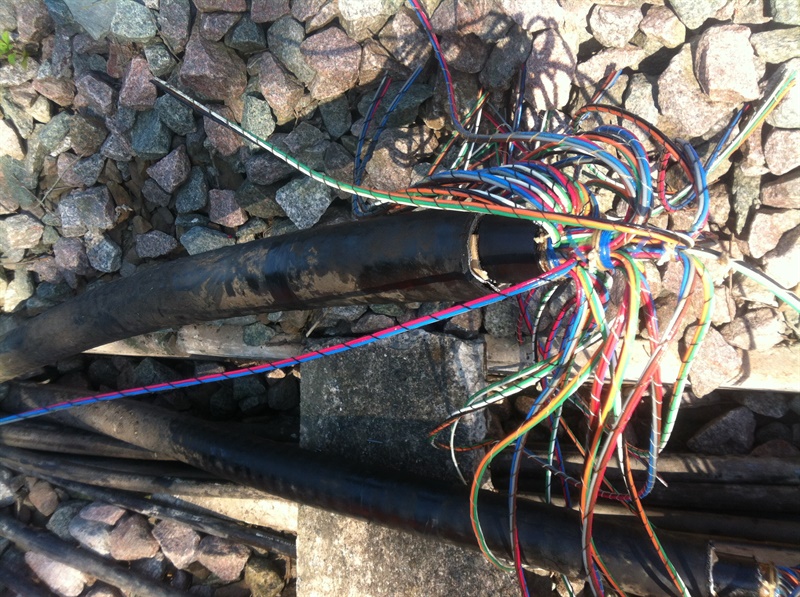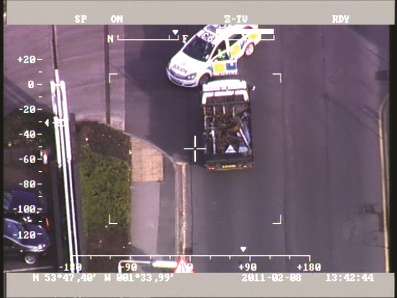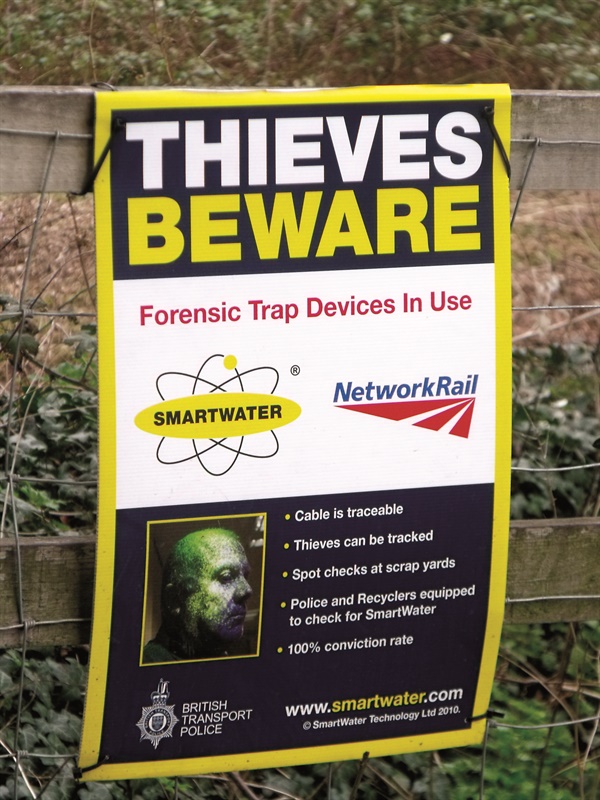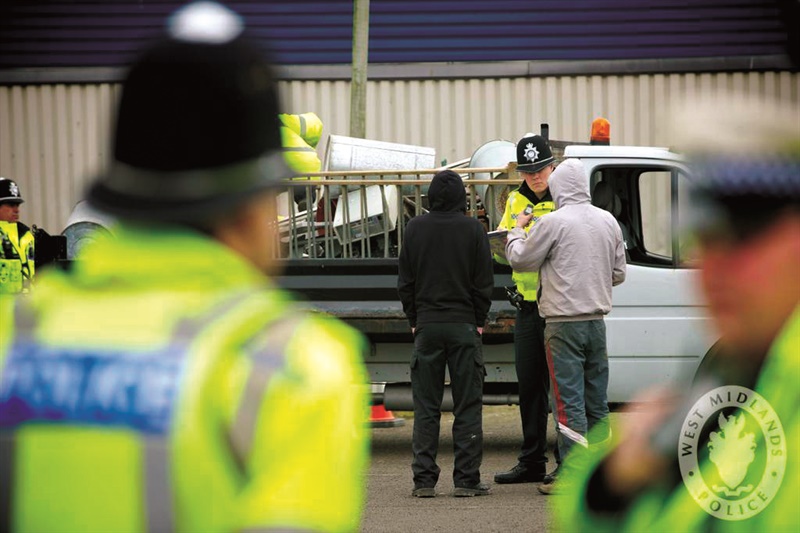12.09.14
Winning the war against cable theft on the railway
Despite the National Metal Theft Taskforce (NMTT) ceasing to operate next month, the British Transport Police (BTP) is confident that the tide has truly turned in the rail industry's battle against cable theft, writes David Stevenson.
Head of the NMTT, Detective Superintendent Alison Evans told RTM: “Though the taskforce will cease to operate in October, the work will carry on and we are confident all police forces, and industries affected by metal theft, are well-equipped to continue to make life difficult for metal thieves and unscrupulous metal recyclers.”
Det Supt Evans’ views do seem to be backed up by the facts. Cable theft on the railways is now in decline, with the number of incidents recorded by Network Rail falling 37.6% from 287 in 2012-13 to 179 in the financial year 2013-14.
Not long ago, in 2011, metal theft was hugely disruptive and seemed out-of-control, growing by 70%. A Commons transport committee report then called it a ‘growth industry’ in the UK.
![Network Rail Poster[1] edit resize 635461104990237000 Network Rail Poster[1] edit resize 635461104990237000](../write/MediaUploads/Network_Rail_Poster%5b1%5d_edit_resize_635461104990237000.jpg) That year proved to be the turning point, with huge amounts of collaborative industry and police work thrown at the problem. The BTP says that concerted effort – including enforcement action, partnership working with other police forces, Network Rail, train operators and many other agencies – has brought about “great success”.
That year proved to be the turning point, with huge amounts of collaborative industry and police work thrown at the problem. The BTP says that concerted effort – including enforcement action, partnership working with other police forces, Network Rail, train operators and many other agencies – has brought about “great success”.
According to BTP, over two years, cable crime declined by more than half, with a 47% drop during 2012-13. Within that, theft of live operational cable, which has the potential to cause massive disruption to train services, was down 56% in 2012-13, from 1,114 to 491 offences. There was also an 83% rise in the number of people arrested and charged for metal theft.
Millie Banerjee, chair of the British Transport Police Authority (BTPA), said: “In the past few years metal theft presented a serious problem to the railways, potentially endangering the lives of the travelling public and threatening the efficient running of the rail network which impacted on the economy of our country.
“The Authority made tackling this crime a national priority and today, BTP, under the leadership of Chief Constable Paul Crowther, has made huge progress by significantly reducing metal theft on the railway lines.”
National Metal Theft Taskforce
Following the 2011 nadir, when cable theft was at its worst, the threat that metal thieves posed to the railways (as well as other sectors like telecoms and construction) led the government to fund the NMTT. During its time, the taskforce has developed intelligence, coordinated activity and targeted criminal networks – individual thieves but also the wider criminal market, including ‘rogue elements’ of the scrap metal industry.

By April 2013, some success was already apparent – enough for Network Rail to launch a big communications push stressing how far delay minutes caused by cable theft had fallen in each region (22% in the Western region, 41% in Wales, 43% in the East Midlands, a startling 93% in west and north Yorkshire, 66% in south Yorkshire, 44% in the north east, 86% in Anglia, 54% in the north west and West Midlands, and so on).
In July 2014, the Home Office and Department for Transport agreed to provide a further £500,000 in funding to the NMTT to make its final months as effective as possible, and to continue its hugely successful programme of coordinated national days of action.
Transport minister Baroness Kramer said then: “I am pleased we can continue to fund this nationally important organisation. The potential impact cable theft has on the railways is huge, not least the inconvenience to passengers.
“Network Rail has to compensate operators for the disruption and this is money which could be better spent on improving the network which is a vital part of our economic plan.”
Banerjee, for the BTPA, said the additional DfT funding was very welcome. “BTP, supported by the Authority, have proved to be leaders in this field, championing a change in the law to tackle cable theft and continuing to work every day to ensure that millions of passengers have safe, delay free journeys,” she said.
The NMTT, however, only forms part of the government’s wider programme of work aimed at cracking down on the illegal trade of metal, and its activities have been boosted by legislation. For instance, under the Scrap Metal Dealers Act, which came into effect in October 2013, scrap metal dealers are now required to hold licences issued by local authorities.

Det Supt Evans said that coordinated work across England, Scotland and Wales forms part of an ongoing national programme of activity to combat metal theft in all its many forms.
“It has been carried out across England and Wales, each of which is significantly affected by metal theft in different ways, and is being reinforced by extensive police and partner activity in Scotland where similar legislation to the new Scrap Metal Dealers Act is being progressed,” she said.
“This Act, coupled with integrated activity from police and partner agencies, has certainly had an effect on levels of offending which had reduced dramatically during the past 12 months.”
Funding worry
Ian Hetherington, director general of the British Metals Recycling Association (BMRA), welcomed news that the NMTT was granted further funding.
He added that Home Office figures show a steady decline in metal theft offences across England and Wales in 2012-13 – proof that coordinated enforcement through initiatives such as the Taskforce is effective.
“The news, however, is tinged with regret that the success of the NMTT has not been recognised with sustainable funding beyond September,” said Hetherington. “The new Scrap Metal Dealers’ Act must be enforced with vigour – if not, metal theft will increase at the expense of the legitimate industry.”
But Conservative MP Richard Ottaway, who played a key role in getting new scrap metal legislation passed, said earlier this year: “The taskforce was set up as a temporary measure to bridge the gap until such time as the new licensing scheme was in place. It can’t go on indefinitely – the policing of scrap metal thefts has to become ‘business as usual’. And when that happens, the disbanding of the taskforce should have no negative impact on metal thefts and enforcement.”
The taskforce was originally set to end its work in March, but this was extended into September 2014.
Dedicated to the cause
Ryan Turner, project manager at Network Rail, told RTM that it has dedicated teams working with BTP to target hotspot areas using technology and patrols.

(Image copyright Elliott Brown. Creative Commons)
“It is difficult to attribute the reduction in incidents to any single activity,” he said. “But certainly we believe the introduction of the Scrap Metal Dealers Act in 2013 has helped to deter dealers from taking unlicensed railway cable and provided police with much-needed improved powers to close down illegal dealers.”
Although the number of incidents does seem to be decreasing nationwide, the problem hasn’t been totally eradicated. In one recent incident, the BTP reported that a “large quantity of cable had been stolen from the railway, in the vicinity of the signal box at Blair Atholl in Perthshire”.
Det Supt Evans told RTM: “There is still work to be done, as thieves and unscrupulous scrap metal dealers – which constitute a tiny minority and do not reflect the good work being done in the industry – will still take risks to profit from stolen metal.”
She added that although the NMTT will cease to exist later this year, the legacy it leaves behind will help tackle this issue in the future.

“The taskforce has been instrumental in bringing about significant reductions in offending across the country,” said Det Supt Evans. “Through wide sharing of best practice and information, the taskforce has been able to improve the way in which police forces deal with metal theft in terms of both detection and reduction.
“Frontline officers across the country are now better informed regarding metal theft and the tactics advocated by the taskforce during the past few years have been adopted as business as usual.”